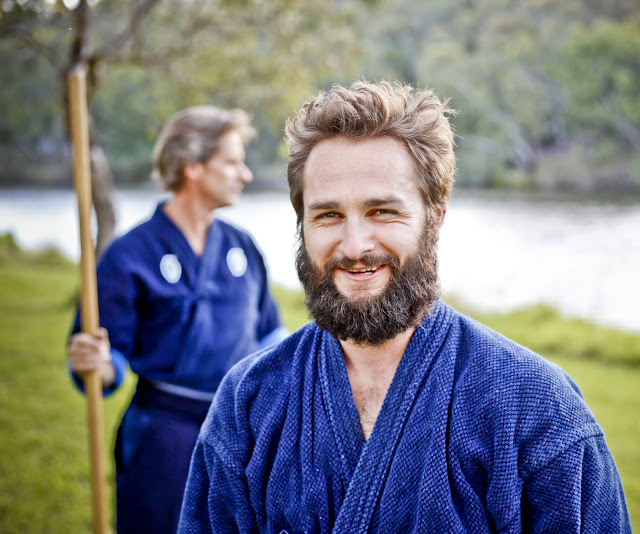Two Week Challenge
What’s the single most important ingredient in
surviving a street fight?
Training, technique or presence of mind?
All three? I agree. We need to train our muscle memory in order to learn how to
move efficiently and effectively.
We need to train our bodies to endure, sustain and prevail. We need to be mentally prepared for
anything and have the focus to engage effectively and assess situations on the
fly.
A friend asked, over dinner the other night, if I would
do ok in a fight. I have no
idea. I’ve been training my body
to move and endure, my mind to stay focused and broad these past fourteen
years, but I know the smallest thing can bring you undone in an instant. I’ve seen experienced brawlers stumble on a crack in the footpath and come undone against a drunk with no fighting experience. I’ve also seen tunnel vision get the better of supposedly experienced security as they weren’t looking for multiple attackers. So how do we train for bad luck or uneven odds?
Meditation is the secret martial arts has to offer over the street fighters code of fearlessness and balls-out aggression. We need to train for that too, but as students of kobudo, our ace up the sleeve lies in regular meditation. It’s one thing to get your game-face on but quite another to broaden your awareness in the moment and use your peripheral vision, calm your breathing and assess the situation. With regular meditation as part of our daily training we have much better odds of keeping our presence of mind during the heat of the moment.
I avoided a serious fight once due to remaining
calm and focused in the face of a madman wielding a chisel at me through my car
window (a longer story for another time), but in summary, he wanted an opponent
to fight and wanted me to lose my cool and give him a reason to attack. Perhaps lucky for me, I’d just left the dojo where we’d be
training unarmed defense against a knife.
I doubt I would have come away unscathed, but to my advantage I was
still in that zone of zanshin to
some extent. I didn’t rise to the
bait, instead I remained resolute about having to defend myself if I had to but wasn’t going to give him an opening by puffing my chest in response to his
threats. In the end, my resolute and calm demeanour began to unnerve him. I could see him beginning to assess me more closely and eventually he ran out of steam, or courage, or perhaps adrenaline. A few minutes
later as I drove away, my adrenaline kicked in and my leg wouldn’t work the
clutch, my heart began to race and my breathing became shorter. Without any training or meditation, all those bodily
reactions could have occurred in the moment and I would have been in serious
trouble.
You may disagree and see sitting on your arse and focusing on your breath as something a little too airey
fairey? Yet, here’s no denying the
medical and psychological benefits that meditation has and there’s a plethora
of documentation out there to back this claim up.
My first martial arts teacher told us that with
consistent meditation, our perception of time slows in the moment. I was sceptical at first, but whenever
I’ve strung some good solid months of meditation together, that statement
proved itself to be true. It’s not
that the world magically slows down and we can see with super-human
clarity. It’s our nervous system
running smoother and more efficiently.
Our brain has more time to process what we see, predict and strategise movement all in the moment. Training zanshin during keiko also helps us utelise this important function of the brain. When we are in that calm but focused
state during combat, the same clarity and strategies of movement will adhere to our
muscle memory and cerebral processing.
There’s nothing more unnerving than an opponent who
appears resolute and unperturbed by the outcome of impending violence. Chances are that an opponent like this is highly unlikely to be shocked or taken unawares either. Their presence of mind is like a still pond, reflecting only the reality in front of them, not filled with all the fears, scenario building or bravado that might be attributed to the martial artist who does a lot of kata but no meditation.
So, meditate much? Try just 10 - 20 mins a day either in the evening or better yet, in the morning, and see if you feel any different after a couple of weeks? I guarantee you won't flinch on the mats or startle so easily if a car backfires on the street. Better yet, your presence of mind in just about any situation will be calmer and better able to handle a stressful situation.
Try it and let me know if I'm wrong...
Travis
Ikkyu
Sessa Takuma
So, meditate much? Try just 10 - 20 mins a day either in the evening or better yet, in the morning, and see if you feel any different after a couple of weeks? I guarantee you won't flinch on the mats or startle so easily if a car backfires on the street. Better yet, your presence of mind in just about any situation will be calmer and better able to handle a stressful situation.
Try it and let me know if I'm wrong...
Travis
Ikkyu
Sessa Takuma

Comments